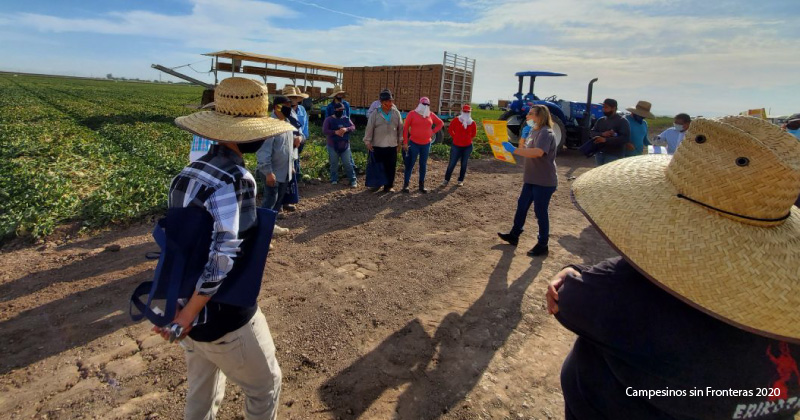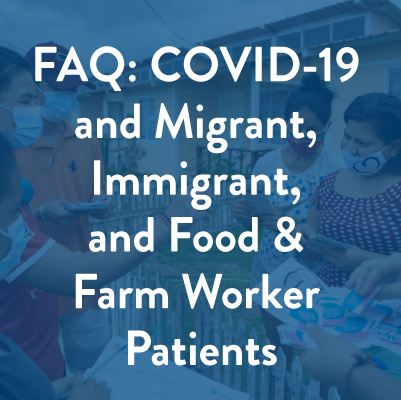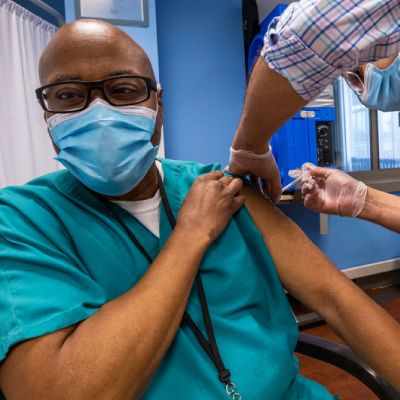- Who We Are
- Clinician Employment
- Publications
- Witness to Witness (W2W)
- Kugel & Zuroweste Health Justice Award
- Your Voice Matters: Photovoice Project
MCN Position Statement: Testing of Agricultural Workers Helps Essential Workers Stay Safe and Healthy
Tue, 09/29/2020 | by MCN Admin

MCN supports testing for asymptomatic COVID-19-exposed agricultural workers for the following reasons:

[Editor's Note: Join Migrant Clinicians Network to hear from frontline clinicians about their successes and barriers to testing the agricultural workers they serve, and talk through the following position statement and algorithm. The webinar takes place on Thursday, October 1 at 1pm Pacific/ 3pm Central/ 4pm Eastern. Click here to register.]
In the absence of a national, evidenced-based testing strategy, decisions regarding the provision of COVID-19 tests for agricultural workers have been left to states, to counties, and, in many cases, to individual farms to manage. Migrant Clinicians Network stands for equitable and accessible testing that will slow the spread of COVID-19 among agricultural workers and rural communities. Agricultural workers, many of whom are immigrant and migrant, are essential workers critical to our food supply and we must work to ensure testing, as well as fair, equitable, and just access to care. To achieve this aim, MCN calls for the provision of COVID-19 testing. Additionally, protocol to provide isolation and quarantine support for workers must be implemented to protect workers from housing and wage instability and support agricultural workers’ health.
MCN strongly believes that all food and agricultural workers – including immigrant, migrant, and seasonal field and orchard workers, meatpackers, seafood workers, and poultry workers -- should have access to COVID-19 testing whenever they are symptomatic, but also when they are asymptomatic and when they are concerned about their exposure to COVID-19. They should not be intimidated or coerced by their employers to forego testing. Given that many migrant agricultural workers are dependent upon their employers for transportation to medical care, provision of testing at the migrant camps after work hours is preferable to decrease barriers to care.
These interim recommendations reflect the current best understanding of the ideal scenario, with recognition that testing availability and turnaround time will vary greatly by region and over time. COVID-19 tests with delayed turnaround times, while perhaps frustrating and impractical for the worker who is tested, will still provide information about the burden of disease in a workplace and are clinically useful.
MCN supports testing for asymptomatic COVID-19-exposed agricultural workers for the following reasons:
1. Essential workers need to be provided maximal protection from COVID-19.
Agricultural workers’ designation as “essential” correlates to increased risk in the workplace, as they continue to work despite local outbreaks or hotspots. At present, this designation does not coincide with national regulation to ensure their health and well-being on the job -- a shocking and unacceptable norm that imparts that agricultural workers are low-wage expendable labor. While some states have enacted regulations to protect agricultural workers, many regions of the country continue to lack regulatory protections. (See Resources for more on state regulations.) Some agricultural workers may be reluctant to report symptoms of COVID-19 infection to their employers for fear of retaliation and job loss. Thus, agricultural workers who are self-reporting as asymptomatic may be dismissing symptoms because of their inability to take time off of work.
2. Agricultural workers are at a higher risk to contract COVID-19 because of social determinants of health.
Many agricultural workers experience numerous social determinants that impacted their health status before the pandemic. Crowded living and working conditions; low income; fear of immigration status; lack of workplace regulations; poor access to health care, healthy food, clean air and water, and safe communities; language and cultural barriers; and migration itself can each negatively impact an agricultural worker’s health. Concurrently, these social factors amplify each other. Agricultural workers have low ability to avoid exposure on the job and they have fewer resources to determine infection and to isolate or access care if they do fall ill.
Although data gaps continue to present an injustice in themselves, the limited data that are available indicate that Latinx communities have had higher rates of COVID-19 infection, while also reporting high levels of food and rent insecurity.
Many agricultural workers experience numerous social determinants that impacted their health status before the pandemic. Crowded living and working conditions; low income; fear of immigration status; lack of workplace regulations; poor access to health care, healthy food, clean air and water, and safe communities; language and cultural barriers; and migration itself can each negatively impact an agricultural worker’s health. Concurrently, these social factors amplify each other. Agricultural workers have low ability to avoid exposure on the job and they have fewer resources to determine infection and to isolate or access care if they do fall ill.
Although data gaps continue to present an injustice in themselves, the limited data that are available indicate that Latinx communities have had higher rates of COVID-19 infection, while also reporting high levels of food and rent insecurity.1
3. Inequities in testing are rampant.
While many institutions like universities are requiring arrival and ongoing testing for students and staff, and some are able to test with less than a 24 hour turn around, our essential agricultural workers are not afforded the same access to testing. In many cases, agricultural workers who are tested wait days or weeks for test results, leading to long quarantine periods and rendering the results less useful to the individual worker, while still relevant for epidemiologic surveillance data.
Additionally, some farm owners are refusing to allow local community health centers, local health departments and others to provide agricultural worker testing, for fear of disrupting workflow and/or concern over drawing media or community scrutiny to a potential workplace outbreak. With poor testing infrastructure and access, and discouragement and impediments from workplaces, agricultural workers are frequently unable to access testing despite their “essential” status.
4. Agricultural workers in many cases are not provided with a clear understanding of consequences of a test.
Agricultural workers very frequently do not have a safety net if they are to miss work: little to no savings, no health insurance, and, for migrant workers in particular, few community connections or resource access. Many are ineligible for federal COVID-19 relief because of immigration status. Many agricultural workers have told clinicians in our network that they are fearful of taking a test because of the unclear consequences. Many fear they will lose their job or ability to work if they test positive. Others express concern about the lack of clarity from employers on wage relief or quarantine housing. In the absence of clearly stated and communicated protocols, agricultural workers have no assurance on the consequences of a test.
5. Farm owners are concerned about interrupted harvests and limited work forces.
Farm owners also need a clear understanding of what it means for their workforce if a worker has a positive COVID-19 result. Community health centers and community partners can support farm owners to build a protocol that will help prevent agricultural workers from becoming ill and reduce the risk of a large outbreak on the farm, thereby avoiding work disruption and/or shutdowns.
MCN recommends the following:
- MCN recommends COVID-19 testing and follow-up for essential workers, including agricultural workers, who are currently asymptomatic, but have been exposed to COVID-19.
- COVID-19 testing must be done rapidly, ideally with short result turnaround time, although we recognize that quick result return is not always feasible.
- Tests with quick turnaround times are needed to halt the spread of COVID-19 in the workplaces of essential workers, and especially in situations of congregant living, such as mobile agricultural worker camps.
- Test results with longer turnaround times require greater resources on the part of the farm and provide less relevant information for the individual worker but can still help farms monitor a potential outbreak.
- Tests with quick turnaround times are needed to halt the spread of COVID-19 in the workplaces of essential workers, and especially in situations of congregant living, such as mobile agricultural worker camps.
- If an agricultural worker tests positive, the worker should be provided with isolation housing, food, and wage relief:
- COVID-19 positive workers must not be allowed to work, even if they are asymptomatic or mildly symptomatic.
- Housing. Farm owners must provide separate trailers for COVID-19 positive workers.
- Separate trailers must be provided for COVID-19 positive workers. They must not share kitchen or bathroom facilities with any workers who are not also positive.
- Farm owners are encouraged to partner with community and federal agencies to increase access to housing for these categories. In other national emergencies, like Hurricane Katrina, FEMA has provided ready-to-inhabit trailers.
- Separate trailers must be provided for COVID-19 positive workers. They must not share kitchen or bathroom facilities with any workers who are not also positive.
- Food: Regular meals should be safely delivered to housing when agricultural workers are required to isolate.
- Job assurance: Those who require isolation or quarantine will need assurance that their jobs will be available to them once they complete their isolation period.
- Wage relief: Agricultural workers who are required to isolate should be provided with wage relief. The CARES Act applies to most farmworkers regardless of visa status and entitles them to 80 hours of paid leave due to missed work for COVID-19 related reasons.
- COVID-19 positive workers must not be allowed to work, even if they are asymptomatic or mildly symptomatic.
- If an agricultural worker is determined to be exposed, the worker should be screened for COVID-19 symptoms and provided with testing, quarantine housing, food and wage relief:
- Testing: Asymptomatic COVID-19 exposed workers should be offered testing at the beginning of their 14-day quarantine. They must continue their 14-day quarantine even if they initially test negative. They are at high risk for developing the infection over those 14 days and must be kept separate from both COVID-19 positive workers and unexposed workers, with separate kitchen and bathroom facilities.
- If asymptomatic COVID-19 exposed workers become symptomatic during their 14-day quarantine, they must be quickly isolated from other asymptomatic exposed workers and retested. They should be housed separately while awaiting test results. If they test positive, they should be moved to isolation with other positive workers. If they test negative and clinical suspicion of COVID-19 is low, they can return to quarantine in asymptomatic COVID-19 exposed housing.
- If asymptomatic COVID-19 exposed workers become symptomatic during their 14-day quarantine, they must be quickly isolated from other asymptomatic exposed workers and retested. They should be housed separately while awaiting test results. If they test positive, they should be moved to isolation with other positive workers. If they test negative and clinical suspicion of COVID-19 is low, they can return to quarantine in asymptomatic COVID-19 exposed housing.
- Housing: Trailers must be provided for asymptomatic COVID-19 exposed workers who initially test negative, separate from COVID-19 positive workers, and COVID-19 symptomatic workers who are awaiting test results.
- Ideally, to stop the spread of the virus, all exposed workers would be quarantined individually for 14 days and kept from working. Most farms and communities are unable to achieve this, therefore, exposed workers in quarantine should be housed in groups as small as possible. Workers at higher risk of serious illness (over 65 years old, and/or with chronic illness such as diabetes, hypertension, immune disorders) should be kept from work and quarantined individually, if at all possible, to decrease their risk of infection and death.
- Due to the essential nature of their work, some states have allowed exposed, asymptomatic workers who initially test negative to continue to work during their quarantine as long as they are cohorted only with other tested, exposed asymptomatic workers in their sleeping, eating, and bathroom facilities, in their transportation to and from work, and while working.
- Ideally, to stop the spread of the virus, all exposed workers would be quarantined individually for 14 days and kept from working. Most farms and communities are unable to achieve this, therefore, exposed workers in quarantine should be housed in groups as small as possible. Workers at higher risk of serious illness (over 65 years old, and/or with chronic illness such as diabetes, hypertension, immune disorders) should be kept from work and quarantined individually, if at all possible, to decrease their risk of infection and death.
- Food: Regular meals should be safely delivered to housing when agricultural workers are required to quarantine as they will not be able to leave their camps to shop.
- Job assurance: Those who are required to quarantine and not allowed to work, will need assurance that their jobs will be available to them once they complete their 14-day quarantine period.
- Wage relief: Agricultural workers who are required to quarantine and not allowed to work should be provided with wage relief. The CARES Act applies to most farmworkers regardless of visa status and entitles them to 80 hours of paid leave due to missed work for COVID-19 related reasons.
- Testing: Asymptomatic COVID-19 exposed workers should be offered testing at the beginning of their 14-day quarantine. They must continue their 14-day quarantine even if they initially test negative. They are at high risk for developing the infection over those 14 days and must be kept separate from both COVID-19 positive workers and unexposed workers, with separate kitchen and bathroom facilities.
In order to provide tests to agricultural workers, clear protocol need to be laid out, to maintain trust with agricultural workers and to assure farm owners on the consequences of testing. MCN’s algorithm may be consulted by farm owners in conjunction with their local health department to prepare to successfully test agricultural workers and respond to test results.
Resources
- The National Employment Law Project keeps an up-to-date list of state and local workplace safety regulations issued to protect workers from COVID-19 in the workplace: “Which States and Cities Have Adopted Comprehensive COVID-19 Worker Protections?”
- MCN's algorithm helps to determine whether a farm is prepared for testing of agricultural workers. Download the algorithm as a PDF or Powerpoint.
1 Krieger N. ENOUGH: COVID-19, Structural Racism, Police Brutality, Plutocracy, Climate Change—and Time for Health Justice, Democratic Governance, and an Equitable, Sustainable Future. Am J Public Health, (advance access, August 20, 2020). http://doi.org/10.2105/AJPH.2020.305886
Like what you see? Amplify our collective voice with a contribution.
Got some good news to share? Contact us on our social media pages above.
Return to the main blog page or sign up for blog updates here.







